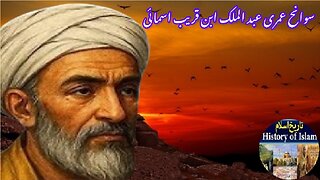Premium Only Content

Four fundamental themes and Abul Hasan چار بنیادی موضوعات اور ابوالحسن
@islamichistory813 #ThematicAnalysis #AbulHasan #IntellectualJourney
Four fundamental themes and Abul Hasan.
Dekhti Aankhooon aur sountay kaanoon ko Asslamoalaikum, sisters, brothers friends and elders, In This Islamic video presents an in-depth analysis of four essential themes that are pivotal in various fields of study, highlighting the influential role of Abul Hasan. We will examine how these themes manifest in his work and their broader implications in contemporary discourse. Please be with us and watch complete video as we are describing meaning of behind these concepts.
Four fundamental themes ran through Abd as-Salam teaching of to Abu'l Hasan, as perceived from his famous Hizb, called as-Salat al-Mashishiya:
the Oneness of Existence (wahdat al-wujud) which he said could be realised only through asceticism,
fear of God and His judgements (khawfu billah),
the belief that God is everywhere and that it is necessary to see His Face in everything that He has created,
that only through the drowning in the Ocean of the Unity (awnu fi bahri al-wahadati) can the seeker cast off and leave behind his own existence and attributes to be merged and absorbed into Allah and His Attributes.
Before his departure from Jabal al-Alam, Abd as-Salam foretold his student of his eventual move to Ifriqiya where he will become known by the name of Shadhili and the eminent spiritual station he will eventually inherit from Abd as-Salam himself. Abu'l Hasan relates that in a dream, he saw his master standing near the Divine Throne. When he told him of this dream in the morning, Abd as-Salam replied, "O Ali, it was not me you saw, it was the station you will inherit from me."
O Ali, God is God, and men are men. When you are among the people, keep your tongue from mentioning the Sirr (secret) and your heart from imitating their ways. Be assiduous in the fulfilment of the mandatory practices of the religion and protect your bodily members from forbidden things. In you the role of sainthood will have reached fruition. Only admonish others to the degree that is obligatory upon you. And say, "O God, give me repose from their mention [of me] and from any obstacles arising from them. Deliver me from their evil. Let Your bounty suffice me from [having to seek] their bounty, and protect me among them by Your special grace. Verily, You have power over all things... O Ali, flee from men's benevolence more than you flee from their malevolence. Because their benevolence will afflict your heart, while their evil will only afflict your body, and it is better that the body be afflicted than the heart.
The parting words of advice and admonition that Abd as-Salam gave his disciple before he departed for Tunis emphasised the transformation of consciousness to inward and outward God-centeredness, contentment with God in all states, and the inner withdrawal from creation in prosperity and adversity. These seminal teachings of Abd as-Salam would, through Abu'l Hasan, become the fundamental precepts of the Shadhili Tariqa
Remaining with his master for a while, Abu'l Hasan then departed for Shadhila, in Tunisia, on orders from his teacher; and from there he received the name of al-Shadhili. He entered a new retreat in a cave on top of Jabal Zaghwan close to Shadhila accompanied by his first companion Abu Yahya Abdellah ibn Samala al-Habibi. After intense spiritual exercises in the Jabal Zaghwan region, he was ordered in a vision to teach Sufism.
Accordingly, he set up his first institution (zawiyah) in Tunis in the year 625/1228, just when the new governor, Abu Zakariyya', also arrived. During his early years in Tunis, Abu'l Hasan first taught forty students who were known as the forty friends (al-awliya al-arba'un). His new tariqah was a stunning success, drawing masses of people from all walks of life, including the sultan's family.
On one of his trips to the East, an Ayyubid sultan conferred on him and his descendants, by way of a religious endowment, one of the enormous towers that arose from the walls formerly encompassing the city of Alexandria in Egypt.
Abu'l Hasan remained in Tunis for a number of years until one day God Most High brought him a young man who was to become his successor and the inheritor of his station and his holy line, Abul Abbas al-Mursi, from Murcia in Spain.
So sisters brothers friends and elders, tomorow we will be described What said Prophet PBUH in dream of Sheikh Abul Hassan. Allah hafiz
===============================
-
 6:31
6:31
ISLAMIC HISTORY
9 hours agoBiography of Abd al-Malik Ibn Qarib Isma'i سوانح حیات عبد الملک ابن قریب اسمائی
5 -
 LIVE
LIVE
TimcastIRL
1 hour agoDOJ Releases Charlie Kirk Assassin Messages, Trans Left Aligned Confirmed | Timcast IRL
41,489 watching -
 LIVE
LIVE
Drew Hernandez
6 hours agoMASS CONFUSION AROUND CHARLIE'S MURDER
888 watching -
 1:01:40
1:01:40
HotZone
6 days ago"Prepare for WAR" - Confronting the URGENT Threat to America
1593 -
 1:13:57
1:13:57
Glenn Greenwald
4 hours agoYoung Men and Online Radicalization: Dissecting Internet Subcultures with Lee Fang, Katherine Dee, and Evan Barker | SYSTEM UPDATE #516
136K35 -
 LIVE
LIVE
Sarah Westall
1 hour agoCEO of Crowds on Demand: The Fake World of Social Media, Protests & Movements w/ Adam Swart
306 watching -
 LIVE
LIVE
Geeks + Gamers
4 hours agoTuesday Night's Main Event
450 watching -
 40:36
40:36
RiftTV
3 hours agoHow We Got 400 Leftists FIRED for MOCKING Charlie Kirk | The Rift | Guest: Olivia Krolczyk
42.6K26 -
 LIVE
LIVE
Badlands Media
17 hours agoBadlands Story Hour Ep 134: Godzilla Minus One
969 watching -
 LIVE
LIVE
Patriots With Grit
12 hours agoWrongful Death Without Consequences: Inside the Schara Trial | Scott Schara
116 watching